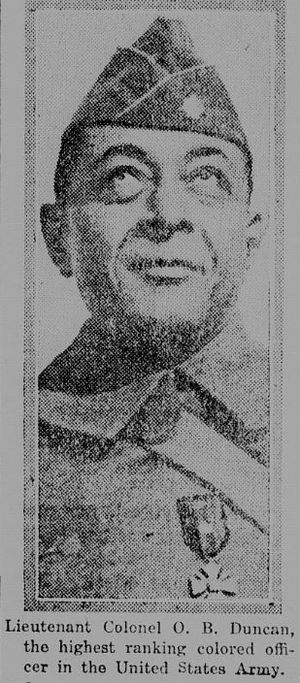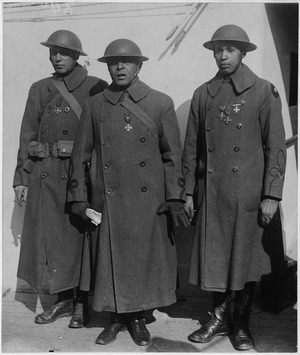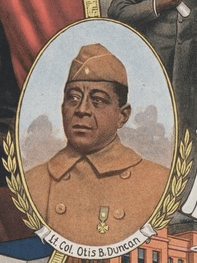Otis B. Duncan facts for kids
Quick facts for kids
Otis Beverly Duncan
|
|
|---|---|

Otis B. Duncan
|
|
| Born | October 18, 1873 Springfield, Illinois |
| Died | May 17, 1937 (aged 63) Springfield, Illinois |
| Buried | |
| Allegiance | |
| Service/ |
|
| Years of service | 1902–1929 |
| Rank | |
| Battles/wars | |
| Awards | |
Otis Beverly Duncan (born November 18, 1873 – died May 17, 1937) was an important officer in the United States Army. He was the highest-ranking African American officer in the American Expeditionary Forces (A.E.F.) at the end of World War I. He served as a lieutenant colonel in the 370th Infantry Regiment. This regiment was special because it was the only combat unit led by African American officers.
Contents
Life Story of Otis B. Duncan
Illinois was different from many other states during the Jim Crow era. This was a time when laws kept Black and white people separate. Illinois created and paid for an all-African-American regiment within its state army, called the Illinois National Guard. This unit, formed in the 1870s, was known as the 8th Illinois Infantry.
Otis B. Duncan was born on November 18, 1873. His parents were Clark and Julia Duncan. He came from a well-known African-American family in Springfield, Illinois. His father owned a grocery store. His great-grandfather, William Florville, was a barber and a friend of Abraham Lincoln.
In 1897, Duncan started working for the state of Illinois. He worked in the office that managed public schools. In 1902, he joined the Illinois National Guard. He was assigned to the 8th Illinois and became an officer. In 1916, the 8th Illinois was called to serve during the Pancho Villa Expedition in Mexico. Duncan served as a major on the regiment's staff.
The Springfield Race Riot of 1908
Even though Otis Duncan was a respected officer, he was a victim of the Springfield Race Riot of 1908. This event happened in his hometown. Reports from that time say that a white mob broke into his house. They destroyed furniture and even smashed his family's piano.
The mob also used Duncan's National Guard saber to damage a portrait of his mother. They stole clothes, jewelry, and other valuable items. The saber was later found and given back to him. The person who stole the sword was arrested and sent to jail.
Otis Duncan in World War I
After the United States joined World War I in April 1917, the 8th Illinois regiment was renamed the 370th Infantry Regiment. This was the only African-American regiment that went to fight in Europe. It was special because it kept most of its African-American leaders. When the soldiers sailed to the Western Front, Duncan became the leader of the regiment's 3rd Battalion.
He was promoted to lieutenant colonel on April 3, 1918. Later, when the regiment's main commander was replaced by a white officer, Lieutenant Colonel Duncan became the highest-ranking African-American officer in the A.E.F. This was a big deal because of the segregationist ideas of the time. Even President Woodrow Wilson and his secretary of war supported segregation.
While fighting on the Western Front against the German Army, Duncan showed great bravery. He was awarded the Purple Heart and the French Croix de Guerre. The 370th regiment fought hard in the last months of World War I. For political reasons, this African-American regiment was placed with the French Tenth Army. The soldiers of the 370th used French equipment and food. German troops reportedly called the men of the regiment the "Black Devils."
After the War
After the war, the 370th Infantry went back to being the 8th Illinois Infantry. On March 18, 1919, Duncan was promoted to the rank of colonel and became the commander of the regiment. The regiment's main office was at Camp Lincoln in Springfield. In 2017, a special collar disc from the 8th Illinois was found. This artifact was from the time Colonel Duncan was in command.
Retirement, Death, and Honors
Colonel Duncan retired from his state education job in 1929. He passed away on May 17, 1937. He is buried at Camp Butler National Cemetery near Riverton, Illinois.
Today, an American Legion Post (a group for military veterans) in Springfield, Illinois, is named after him. In 2020, a city park in Springfield was also renamed in his honor. It used to be named after Stephen A. Douglas.
 | Aaron Henry |
 | T. R. M. Howard |
 | Jesse Jackson |



